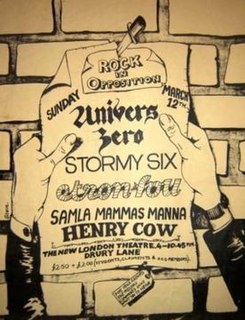
Rock in Opposition or RIO was a movement representing a collective of progressive bands in the late 1970s united in their opposition to the music industry that refused to recognise their music. It was initiated by English avant-rock group Henry Cow in March 1978 when they invited four mainland European groups to come to London and perform in a festival called "Rock in Opposition".
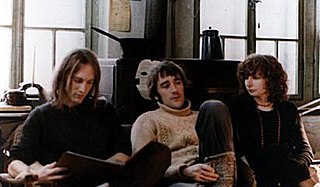
Art Bears were an English avant-rock group formed during the disassembly of Henry Cow in 1978 by three of its members, Chris Cutler, Fred Frith and Dagmar Krause. The group released three studio albums between 1978 and 1981, and toured Europe in 1979.

Henry Cow were an English experimental rock group, founded at the University of Cambridge in 1968 by multi-instrumentalists Fred Frith and Tim Hodgkinson. Henry Cow's personnel fluctuated over their decade together, but drummer Chris Cutler, bassist John Greaves, and bassoonist/oboist Lindsay Cooper were important long-term members alongside Frith and Hodgkinson.

Chris Cutler is an English percussionist, composer, lyricist and music theorist. Best known for his work with English avant-rock group Henry Cow, Cutler was also a member and drummer of other bands, including Art Bears, News from Babel, Pere Ubu and (briefly) Gong/Mothergong. He has collaborated with many musicians and groups, including Fred Frith, Lindsay Cooper, Zeena Parkins, Peter Blegvad, Telectu and The Residents, and has appeared on over 100 recordings. Cutler's career spans over four decades and he still performs actively throughout the world.

Timothy "Tim" George Hodgkinson is an English experimental music composer and performer, principally on reeds, lap steel guitar, and keyboards. He first became known as one of the core members of the British avant-rock group Henry Cow, which he formed with Fred Frith in 1968. After the demise of Henry Cow, he participated in numerous bands and projects, eventually concentrating on composing contemporary music and performing as an improviser.
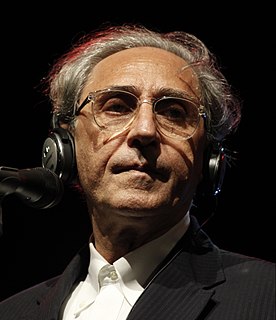
Francesco "Franco" Battiato was an Italian musician, singer, composer, filmmaker and, under the pseudonym Süphan Barzani, also a painter. Battiato's songs contain esoteric, philosophical and religious themes, and have spanned genres such as experimental pop, electronic music, progressive rock, opera, symphonic music, movie soundtrack, oratorio and new wave.

Recommended Records (RēR) is a British independent record label and distribution network founded by Chris Cutler with Nick Hobbs in March 1978. RēR features largely "Rock in Opposition" and related music, but it also distributes selected music released on other independent labels.
New Trolls are an Italian progressive rock band, known for their fusion of rock and classical music. In a way not too dissimilar from fellow prog-rock band Yes, their history is filled with line-up changes, spin-off projects and personal struggles between band members.

The Henry Cow Legend is the debut album of British avant-rock group Henry Cow. It was recorded at Virgin Records' Manor studios over three weeks in May and June 1973, mixed in July 1973, and released in September 1973.

Concerts is a live double album by English avant-rock group Henry Cow, recorded at concerts in London, Italy, the Netherlands and Norway between September 1974 and October 1975. Sides one and two of the LP record consist of composed material while sides three and four contain improvised pieces.
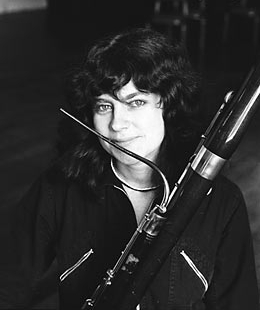
Lindsay Cooper was an English bassoon and oboe player, composer and political activist. Best known for her work with the band Henry Cow, she was also a member of Comus, National Health, News from Babel and David Thomas and the Pedestrians. She collaborated with a number of musicians, including Chris Cutler and Sally Potter, and co-founded the Feminist Improvising Group. She wrote scores for film and TV and a song cycle Oh Moscow which was performed live around the world in 1987. She also recorded a number of solo albums, including Rags (1980), The Gold Diggers (1983), and Music For Other Occasions (1986).

Premiata Forneria Marconi (PFM) is an Italian progressive rock band founded in 1970 which continues to the present day. They were the first Italian group to have success internationally. The group recorded five albums with English lyrics between 1973 and 1977. During this period they entered both the British and American charts. They also had several successful European and American tours, playing at the popular Reading Festival in England and on a very popular national television program in the United States.

Luis Enríquez Bacalov was an Argentine-born film composer who learned music from Enrique Barenboim, father of Daniel Barenboim the conductor of the Berlin, and Chicago orchestras, and also Berta Sujovolsky. Bringing his talent into society he ventured into music for the cinema, and composed scores for Spaghetti Western films. In the early 1970s, he collaborated with Italian progressive rock bands. Bacalov was nominated twice for the Academy Award for Best Original Score, winning it in 1996 for Il Postino. Bacalov composed significant works for chorus and orchestra. Before his death, he was the artistic director of the Orchestra della Magna Grecia in Taranto, Italy.
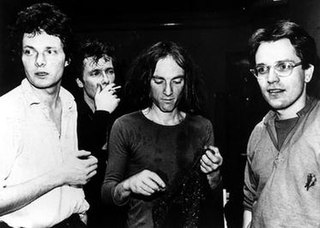
Cassiber were a German avant-rock group founded in 1982 by German composer and saxophonist Alfred Harth, German composer, music-theatre director and keyboardist Heiner Goebbels, English drummer Chris Cutler from Henry Cow and German guitarist Christoph Anders. They recorded five albums, toured extensively across Europe, Asia and North America, and disbanded in 1992.
Franco Fabbri is a Brazilian-born Italian musician, musicologist and broadcaster.

Etron Fou Leloublan, also known as EFL, were a French avant-garde rock band founded in 1973 by actor and saxophonist Chris Chanet. They recorded five studio albums between 1976 and 1985, and released a live album, En Public Aux Etats-Unis d'Amérique recorded during a tour of the United States in 1979. Etron Fou Leloublan were best known as one of the five original Rock in Opposition (RIO) bands that performed at the first RIO festival in London in March 1978.

Un Peu de l'Âme des Bandits is the second album by Belgian avant-rock band Aksak Maboul. It was recorded at Sunrise Studio in Kirchberg, Switzerland in February and August 1979, and released on LP in January 1980 on founding member Marc Hollander's Belgian independent record label, Crammed Discs. At the time the band had changed the spelling of their name to "Aqsak Maboul", and this is reflected on the album's record sleeve. When the album was re-issued on CD in 1995 the spelling of their name reverted to "Aksak Maboul".
Il Castello di Atlante is an Italian progressive rock band based in Vercelli. Although the band was founded in 1974, it released its debut album in the early 1990s. It has since released 9 albums.

Romantic Warriors II: A Progressive Music Saga About Rock in Opposition is a 2012 feature-length documentary film about the Rock in Opposition movement of the late 1970s, the music genre it spawned, and the influence it has on experimental groups across the world. The film was written and directed by Adele Schmidt and José Zegarra Holder, and was released in the United States by Zeitgeist Media. It premiered in Washington, D.C. on September 28, 2012. The film was generally well received by critics, with a reviewer at AllMusic saying that it "covers all the points an aficionado could possibly want".
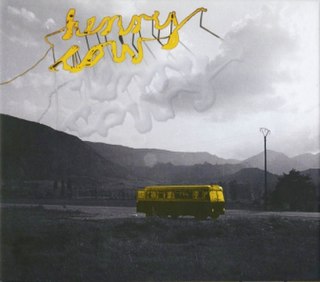
The Henry Cow Box Redux: The Complete Henry Cow is a seventeen-CD plus one-DVD box set by English avant-rock group Henry Cow; it was released by RēR Megacorp in November 2019. The box set comprises the previously released 2006 Henry Cow Box and the 2009 40th Anniversary Henry Cow Box Set, totalling over sixteen hours. A bonus CD: Ex Box – Collected Fragments 1971–1978 was given to advance subscribers of the 2019 Box Redux, and contains newly recovered and previously unreleased recordings, plus the contents of the 2006 box set bonus CD-single: "Unreleased Orckestra Extract". The 2019 Box Redux plus the Ex Box bonus CD contains all the officially released studio and live recordings of Henry Cow, excluding "Bellycan" as released on the 1991 East Side Digital version of Legend, and the complete version of "The Glove" from the 1991 East Side Digital version of Unrest.

















